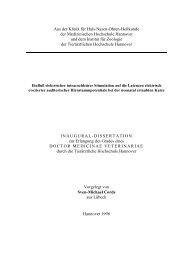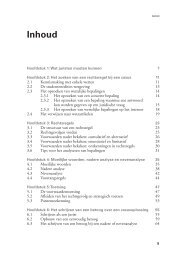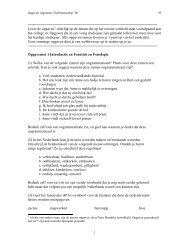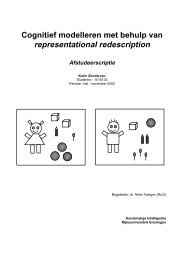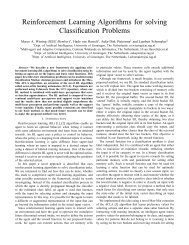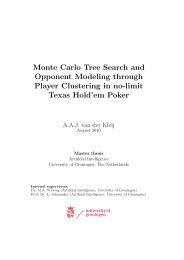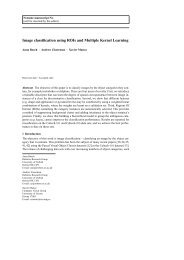Presuppositions in Spoken Discourse
Presuppositions in Spoken Discourse
Presuppositions in Spoken Discourse
You also want an ePaper? Increase the reach of your titles
YUMPU automatically turns print PDFs into web optimized ePapers that Google loves.
Chapter 2<br />
presupposed <strong>in</strong>formation is true, only commit to pretend<strong>in</strong>g it is for the duration of<br />
the dialogue.<br />
These are just a sample of the lexical and syntactic items that have been<br />
associated with the term presupposition. There have been many different proposals<br />
for analyz<strong>in</strong>g the triggers and the presuppositions they <strong>in</strong>duce. The next section<br />
briefly presents some central earlier proposals that laid the foundations for current<br />
theories.<br />
2.2 EARLIER ANALYSES OF PRESUPPOSITIONS<br />
Two major problems <strong>in</strong> analyz<strong>in</strong>g presuppositions were discussed <strong>in</strong> the early<br />
literature on this subject. 5 The first is the problem of presupposition failure, and<br />
has to do with what happens when a sentence presupposes someth<strong>in</strong>g that isn’t<br />
true, and the second is the projection problem, already mentioned <strong>in</strong> the previous<br />
section. The first problem was orig<strong>in</strong>ally noticed by Frege (1892) and <strong>in</strong>troduced as<br />
follows <strong>in</strong> “Über S<strong>in</strong>n und Bedeutung.”<br />
“If anyth<strong>in</strong>g is asserted there is always an obvious presupposition that the simple or compound<br />
proper names used have reference. If one therefore asserts ‘Kepler died <strong>in</strong> misery.’ there is a<br />
presupposition that the name ‘Kepler’ designates someth<strong>in</strong>g; but it does not follow that the sense of<br />
the sentence ‘Kepler died <strong>in</strong> misery’ conta<strong>in</strong>s the thought that the name ‘Kepler’ designates<br />
someth<strong>in</strong>g. If this were the case the negation would have to run not<br />
Kepler did not die <strong>in</strong> misery<br />
but<br />
Kepler did not die <strong>in</strong> misery, or the name ‘Kepler’ has no reference.<br />
That the name ‘Kepler designates someth<strong>in</strong>g is just as much a presupposition for the assertion<br />
Kepler died <strong>in</strong> misery<br />
as for the contrary assertion.”<br />
An important po<strong>in</strong>t here is that Frege makes a dist<strong>in</strong>ction between presupposed<br />
<strong>in</strong>formation and asserted <strong>in</strong>formation, and po<strong>in</strong>ts out that presupposition has to<br />
hold both for affirmative as well as the negated version of the sentence. Frege then<br />
remarked that<br />
“A logically perfect language (Begriffsschrift) should satisfy the conditions, that every expression<br />
grammatically well constructed as a proper name out of signs already <strong>in</strong>troduced shall <strong>in</strong> fact<br />
5 For a more detailed summary of the history and development of theories of presupposition see<br />
van der Sandt (1988) or Beaver (1997).<br />
12



